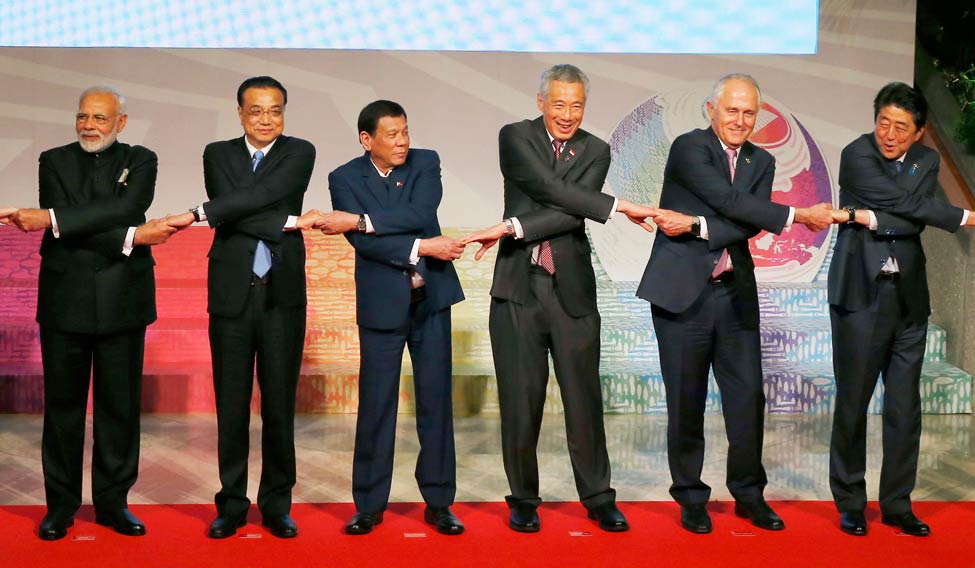The quadrilateral forum consisting of US, India, Japan and Australia , first initiated in 2007 but subsequently failed to take off because of Canberra’s reluctance seems to be getting a new lease of life with their meeting held at Manila at the sidelines of ASEAN summit.
In Manila, the leaders of the four countries met each other individually while their lower-ranking officials met in the quad format.
It is Japanese Prime Minister Shinzo Abe who had first floated the idea of quadrilateral forum otherwise known as “alliance of democracies” in 2005 with an objective of forming a broad front to balance China. The first QUAD collapsed as Australia walked out of the forum for reasons if its own with India following the suit.
A decade later it was during US State Secretary Tillerson’s visit to India in October , 2017 that Alice Wells ,the acting assistant state secretary in charge of South said that Washington was “looking at a working level quadrilateral meeting in the near term.”
The idea was to bring together countries that share the same values “ to reinforce those values in the global architecture.”
A couple of days earlier, Japan’s foreign minister Taro Kono had proposed reviving the quadrilateral forum , an idea that he had discussed with Tillerson and his Austrian counterpart Julie Bishop at the sidelines of a meeting in Manila in August. According to Kono the purpose of the idea was to seek a peaceful maritime zone from Asia to Africa.
The evolving quadrilateral forum is essentially an extension of US-Japan- India trilateral which has been functioning for quite some time, by including Australia into its fold.
Why is the revival of the quadrilateral, taking place after a gap of decade drawing so much of attention in India? After all India has joined so many multi-lateral forums since the end of the cold war. However , this is the first time India is joining a multi-lateral forum ostensibly led by Washington.
Delhi joined Russia-India- China( RIC) trilateral forum that subsequently tuned into BRICS(Brazil-Russia-India -China-South Africa) that strives to transform US-led unipolar world order into multi-polar world. The revival of QUAD is taking place in the wake of growing Chinese unilateralism in Asia. That is why it makes sense if Quad sets the task of preventing the emergence of unipolar Asia.
Though the Manila Quad forum did not produce any joint statement, the national statements talk about their shared interests on promoting connectivity, counter terrorism, addressing proliferation of nuclear weapons and encouraging law-based international order. It might take sometime before the real action on the ground begins.
While making attempts to prevent Chinese unilateralism in Asian affairs makes logic, we should be very careful not to be lured into “containment of China policy” advocated by some circles in US. Nor should we be dragged into any kind of military alliance with US that hints about it so frequently and tacitly off late.
India should set its own terms of engagement in the revived forum. While the proposal to promote cooperation between quad countries in defense, maritime security, and infrastructure development is welcome, providing military dimension to the forum would be suicidal and detrimental to our national interests.
US President Donald Trump and his secretary of State Tillerson have drawn up a vision of a policy that seeks to replace the now abandoned “Pivot’. Washington administration is assiduously wooing India in to what could be a military alliance. India should not lose sight of the fact that US lip service to the term Indo-Pacific could be an instrument of including India in military calculations of US strategy in Pacific and Indo-Pacific merely could mean a Indian military commitment to the US-led alliance in the Pacific ocean.
Arun Mohanty works as a professor at the School of International studies , JNU
Disclaimer: The views expressed in this article are solely those of the author and do not necessarily represent the views of the publication





